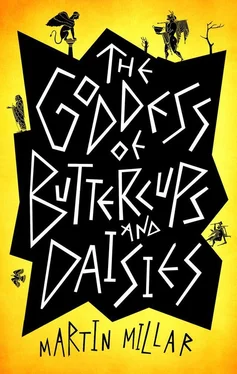‘You look sad, Luxos.’
It was Socrates.
‘My heart is broken,’ announced Luxos. ‘Metris isn’t allowed to talk to me any more.’
‘Who isn’t allowing her?’
‘The Goddess Athena.’ Luxos looked defiantly at the philosopher. ‘I expect you think I’m crazy for saying that.’
‘No, I believe you.’
‘You do? Oh.’ Luxos was pleased, but then his face fell. ‘Athena says Metris has to help with important work. She can’t see me any more.’
The young poet’s brow furrowed, and he began to look angry. ‘It’s outrageous. After all the prayers I’ve offered up to the goddess. And all the daisies I’ve left at her altar!’
A beautiful dark-haired woman appeared behind the street performers. Laet gazed at Luxos.
‘I’m going to have revenge,’ said Luxos to Socrates. ‘I’ll make Goddess Athena regret ruining my romance. I’m going to write a really mean poem about her.’
‘That’s your plan?’
‘Yes.’
Socrates looked at Luxos, slightly raising one eyebrow.
‘Why are you looking at me like that? Athena deserves to have a nasty poem written about her.’
Socrates continued to look at Luxos. Luxos stared down at his feet. He shifted uncomfortably under Socrates’ gaze.
‘Maybe it’s not such a great idea. I’ll probably just get cursed or something. And then I’ll never see Metris again. But what else can I do? I can’t do anything except write poetry.’
In the background, Laet had worn a faint smile, but it was fading as Luxos stood in deep thought.
‘Do you think maybe it would be a good idea to write something nice about Goddess Athena?’ he asked Socrates.
Socrates smiled.
‘Of course,’ said Luxos. ‘You’re right. I’m going to write a really great poem about Athena! Then she’ll let me see Metris again!’
Luxos hurried off enthusiastically, turning to call back to Socrates. ‘Thanks, Socrates. You’re a really wise man!’
The street performers were making a human pyramid, juggling hoops as they climbed on top of each other. Idomeneus joined Laet. He gazed at the departing Luxos.
‘That didn’t go quite as expected,’ he said.
Laet narrowed her eyes, displeased.
‘Socrates’ rationality triumphs over your baleful influence,’ said Idomeneus.
Laet smiled, quite cruelly. ‘Let Socrates have a few small triumphs. Athens will do for him in the end.’
They walked off. As they passed by the street performers Laet directed a fierce scowl in their direction. Immediately their performance went disastrously wrong and they crashed in a painful heap on the ground.
Luxos ran all the way home. He grabbed his lyre, a quill and his very last sheet of parchment. ‘I’m going to write a really great poem about the Goddess Athena,’ he muttered, and got to work.
Aristophanes was in his element. There was nothing like the bustle of a rehearsal space when things were going well. He felt that the Goddess Athena herself might have been smiling on them as they went to work that day. Now that they had the money they needed, everything was starting to go well.
‘Get that dung beetle flying up there! I want to see it swooping over the audience. That’s much better! Hermogenes, have the chorus go through the last number again, I want some rhythm! Where are my new phalluses?’
‘Just arrived. They’re huge!’
‘Do they rise properly?’
‘Like mighty oak trees!’
‘Excellent! This is more like it. I’ll show Eupolis and Leucon how to put on a comedy. Chorus, get these phalluses strapped on and wave them like you mean it!’
A second young assistant arrived in a rush. ‘We’ve just received a message from Isidoros. He got your payment and he’s prepared to take the introductory spot.’
Aristophanes nodded approval. ‘Good news. Isidoros’s poetry recital will warm up the crowd. Have you heard him recently? Sensational lyre playing. And not a bad rhymer, when he’s sober. Was he sober?’
‘His secretary assured me he was.’
‘Then let’s hope for the best.’
A third second assistant hurried over. ‘The new statues are here!’
A team of stagehands carried the new statue of peace onto the stage. It was a lightweight construction, made of wood, for theatrical use only, but it was beautifully carved and painted. The Goddess of Peace herself would have been delighted with it. If there were a Goddess of Peace, that was. Strictly speaking, there wasn’t. But there were so many divine figures in the Athenian pantheon that creating a new one for the purposes of the play wouldn’t offend anyone. As Aristophanes said, who could object to a Goddess of Peace?
‘Great statue!’ he enthused. ‘When that pops up out of the cavern the audience can’t fail to be impressed. And we’ll impress them even more when young Mnesarete makes her appearance.’
Mnesarete, Theodota’s servant, was currently wandering around the stage, semi-clad, rehearsing for her appearance at the end of the play. She was a beautiful young woman. The stagehands had expressed their complete approval.
Hermogenes frowned. ‘Is it really necessary to send on a naked young woman?’
‘Yes.’
‘It still seems cheap.’
‘Cheap? Who cares if it’s cheap? You think these idiots on the judging panel care about art?’
Annoyingly for Aristophanes, Hermogenes wouldn’t drop the subject. ‘I care,’ he said. ‘And you used to as well. I remember when you first appeared in the theatre. All you could talk about was the quality of your poetry. You used to despise stage effects. Said they were taking away from the purity of the drama.’
‘That’s when I was young and stupid. You know as well as I do that the audience is never going to be satisfied with a comedy just because it has the best poetry.’
‘I don’t know that at all. They might be. And even if they’re not, isn’t that what matters to you most? It used to be.’
Aristophanes could feel a slight throbbing in his head. The heat in the open-air rehearsal space was oppressive. ‘What matters to me most is winning the competition. I was swindled out of first prize last year and that’s not going to happen again. Now stop sounding like Socrates and help me unload these new costumes.’
They pitched in to help the stagehands who were carrying a great mass of props and costumes into the theatre. Time was now very short, and everyone was working furiously. The actors had completed their speed run that morning, racing through their lines at a furious pace in an effort to memorise them fully, and it seemed to have worked. Philippus could now deliver his opening speech quite beautifully, and he’d even stopped complaining about the giant beetle.
‘How did you pay for all this?’ asked Hermogenes.
‘Oh, I just called in a few favours.’ Aristophanes looked thoughtful. ‘Hermogenes, do you think a comedy about women ruling the city would be such a bad idea?’
Bremusa went to the private shrine to commune with the goddess. Once again, Athena made herself visible. She wasn’t in her mansion but on the slopes of Mount Olympus, in front of a small rural altar, not much more than an ancient pile of stones.
‘I’ve failed, Goddess. Laet is causing chaos. Everyone is making bad decisions. We’ll be lucky if the whole city doesn’t burn to the ground.’
‘Please don’t let that happen. When the Persians set fire to my temples it reduced me to tears.’
‘I remember. But I don’t know what to do to make things better.’
‘You have to keep trying. If they manage to hold the last session of the peace conference, who knows what might happen?’
Читать дальше












